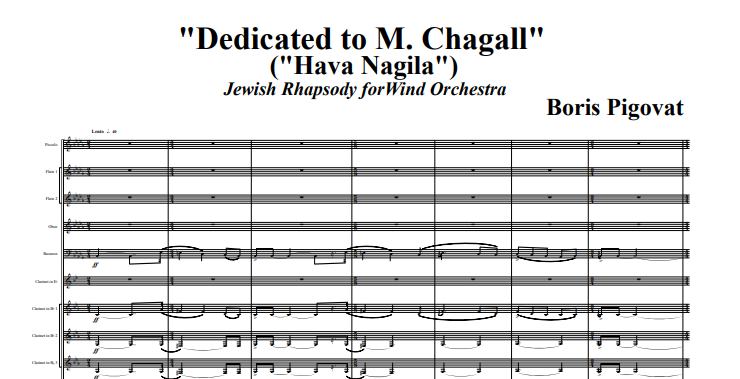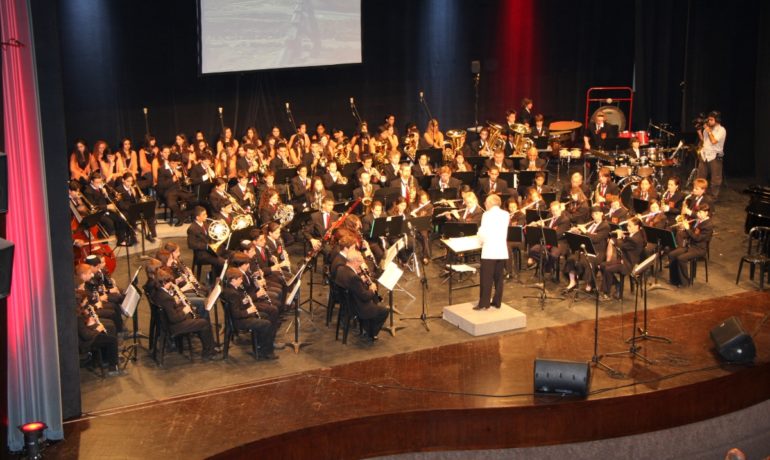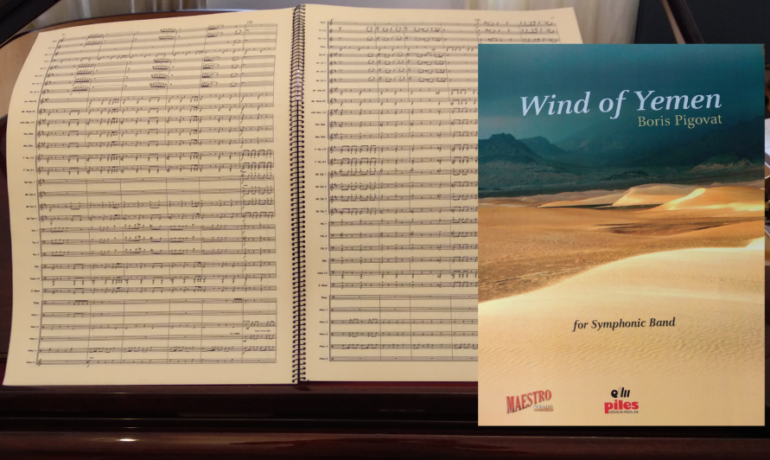
Tag: wasbe


Massada (1997)
- Duration: ca. 14 minutes
- Picc, Fl, Ob, Bsn, P.Cl, 3 Cls, B.Cl, A.Sx, T.Sx, B.Sx, 4 Hns, 2 Cnts, 3 Tpts, 3 Tbns, Bar, 2 Tbas, Str. Bass, Timp, Perc (4).
In 1996 I met Michael Delman, the conductor of the Wind Orchestra of the Petah-Tikva Conservatoire (Israel).
Before meeting him for the first time, I had never written anything for wind orchestra, and I have viewed wind orchestration as limited to bands performing marches or any entertainment music, like songs, waltzes, polka, fantasy, and potpourri.
Mr. Delman opened a new world to me: the wind orchestra, with abilities and repertoire similar to the symphony orchestra. This type of orchestra is called a symphonic wind band or a wind symphony orchestra.
For more than 20 years, Michael Delman and I have collaborated. He and his orchestra premiered most of my compositions written for symphonic wind band. Mr. Delman himself conceived the theme of some of my wind band compositions, including Massada, Wind Of Yemen, Exile, and The Heroic Song.
Massada was the first piece that I composed for symphonic wind band. It was composed, and also performed for the first time, in 1997.
Massada (or Masada) is a fortress near the Dead Sea, whose defenders resisted the Romans for seven years and then committed suicide rather than being captured and enslaved by the Romans.
In 1999, Michael Delman and the Petah-Tikva Conservatoire Wind Orchestra performed the European premiere of Massada in the wind-orchestra competition in Zurich, Switzerland, where they won first prize in their category.
They also performed Massada in Festival Mid-Europe ’99 in Schladming, Austria.
Since then, Massada has been performed by various orchestras in Europe, the United States, and in South America, and several orchestras have recorded it.
The most important performances took place at:
- ISCM “World Music Days 2000” Festival (Luxembourg)
Grand Orchestre “Musique Royale des Guides” (from Belgium)
Conductor: Norbert Nozy - 2003 WASBE Conference (Jonkoping, Sweden)
The Symphonic Band of Kiskunfelegyhaza (from Hungary)
Conductor: Ferenc Jankovszki - 2006 CBDNA Conference (Nashville, USA)
Murray State University Wind Ensemble
Conductor: Dennis Johnson
Below are some recordings.

Song of the Sea (2005)
Poem for Symphonic Wind Band
- Duration: ca. 20 minutes
- Picc (=Fl 1), 2 Fls, A.Fl (= Fl 2).Obs, Bsns, 3 Cls, B. Cl, 2 A. Sxs, T. Sx, B. Sx, 4 Hns, 5 Tpts , 3 Tbns, Bar, 2 Tbas, Str. Bass, Perc (6)
In 2005, I composed Song of the Sea for the conductor and director of the Bands and Symphony Orchestra at Murray State University in Murray, Kentucky: Dennis L. Johnson.
I composed the Song of the Sea for Dennis Johnson in 2005.
This is what he said about the piece:
Boris Pigovat is a bright, fresh voice in the world of wind band composition. His “Song of the Sea” is an original tone poem written for myself and the Murray State University Symphonic Wind Ensemble and was premiered in a special performance in Carnegie Hall on March 29 of 2005. This dramatic work captures the beauty and majesty of the open sea as well as its darker and more ominous mood during a ferocious storm. The work carries the listener on a journey through calm and tempest and ends with a grandiose climax that rivals any of the great programmatic composers of this or any era. The wind ensemble and I thoroughly enjoyed the preparation and performance of this masterful work as did the exhilarated crowd in Carnegie Hall that called us back three times. “Song of the Sea” deserves to be on all collegiate and (technically proficient) high school band programs throughout the world. It is a masterpiece for wind band.
That same year, maestro Johnson premiered the piece with the Murray State University Wind Ensemble at Carnegie Hall, in New York.
Later that summer, he performed it at (a repertoire session at) the WASBE Conference in Singapore.
The piece also received the 2005 ACUM Prize (ACUM is the Israeli analog of ASCAP).
In 2009, Song of the Sea had its European premiere in Germany, performed by the Munich Academic Wind Orchestra, conducted by Michael Kummer.
Below is the recording from the premiere in Carnegie Hall.

Wind of Yemen (2000)
Poem for Symphonic Wind Band
- Duration: ca. 18 minutes
- Picc, Fl, Ob, Bsn, P.Cl, 3 Cls, A.Cl, B.Cl, A.Sx, T.Sx, B.Sx, 4 Hns, 3 Cnts, 2 Tpts, 3 Tbns, Bar, Tba, Str. Bass, Timp, Perc (4-5)
The symphonic poem Wind of Yemen for Symphonic Wind Band (2000) is based on the traditional tunes and dance melodies which were preserved during the centuries by a very closed society of Yemenite Jews.
The work comprises two connected movements. The first movement depicts a Yemenite desert landscape. The second movement depicts the Yemenite folk celebration.
The concept was suggested to me by Michael Delman.
The task was very challenging for me, this was my first introduction to Yemenite Jewish folklore.
When I was a young composer, in the 1980s, Professor Yuri Alexandrovich Fortunatov gave me some advice:
If you need to compose a piece for folklore that is completely foreign to you, first you must “sink” into it. Only when you feel that you own the style, like it is in your blood beneath the skin, are you ready to compose…
Following that advice, I spent almost three months listening to a massive quantity of audio recordings from Yemenite Jewish folk music, until I was able to internalize the unique feel of its melodic and rhythmic patterns.
In 2000, I completed the Wind of Yemen, and it was premiered by Michael Delman and the Petach-Tikva Conservatoire Symphonic Band.
Wind of Yemen was performed at the Asian Music Festival 2003 (in Tokyo) by the Kosei Wind Orchestra, conducted by Douglas Bostock.
In 2009, it was performed at the WASBE conference by CAM Bétera, conducted by Luis Serrano Alarcón.
In 2010, it was performed in Mano a Mano festival, Bunol, Spain, by CIM La Armónica de Buñol (Valencia), conducted by Frank De Vuyst.
That same year, Wind of Yemen was published in Spain by Piles Editorial de Musica.
In 2015, it was performed at the WASBE conference (in San Jose, California, USA), by the National Youth Symphonic Band of Israel, conducted by Motti Miron.
In 2018, it was performed at the Singapore International Band Festival, by the Orchestra Collective of Singapore, conducted by Yibin Seow.
Below are recordings from Singapore, Tokyo and from the 2009 WASBE conference. You can also listen to the Mano a Mano festival performance here .
Singapore International Band Festival, 2009
Asian Music Festival, Tokyo, 2003
2009 WASBE Conference, Cincinnati, USA
I thought that several other of the performances
were also very good, but here is
where specific works stand out in my mind
as being significant. Boris Pigovat’s Wind of
Yemen performed by the Symphonic Band
of Centre Artístic Musical de Bétera was
marvelous...
I also enjoyed The Winds of Yemen by Boris Pigovat, with its evocative ethnic music. He has a superb website with details of his music, including the Song of the Sea, premiered in Carnegie hall by Murray State University Wind Ensemble conducted by Dennis Johnson. As I reported in a recent homepage, this work was a great success in its recent German premiere, conducted by Michael Kumnmer, and I have no doubt that The Winds of Yemen will join it as a fine example of this composer's music.